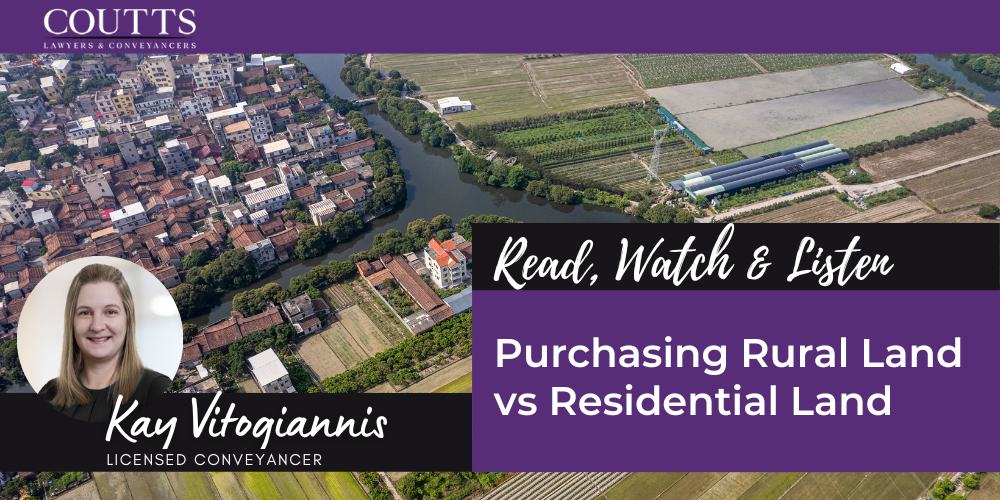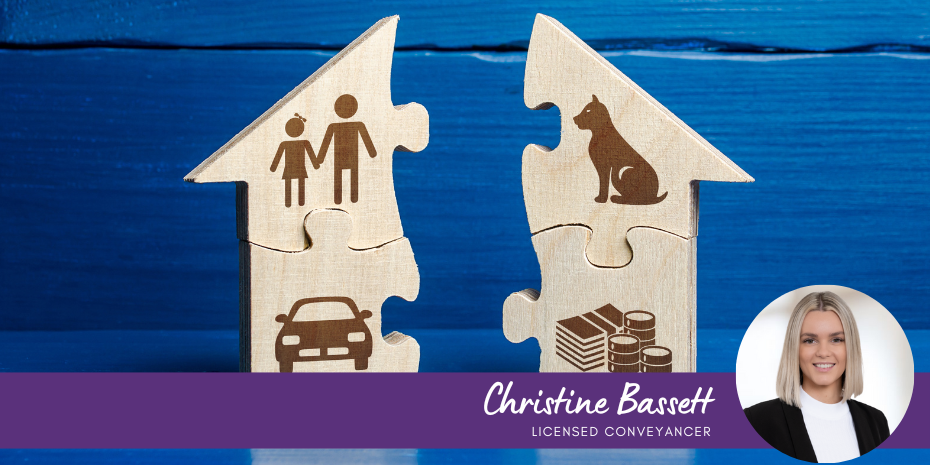KEY TAKE OUTS:
- What is Rural Land?
- What are the differences between purchasing rural and residential land?
- What additional searches and enquiries should be made?
- What are the stamp duty obligations?
What is Rural Land?
Land is considered to be “rural land” when the land exceeds 2.5 hectares/6.2 acres in accordance with Section 66Q the Conveyancing Act 1919 (NSW). The land size is the determining factor not whether or not the land is used for solely residential purposes or farming purposes. The legislation governing selling rural land is the Property, Stock and Business Agents Act 2002.
Differences when Purchasing Rural Land and Residential Land – Agent and Contract
In NSW a real estate agent can sell rural land up to 20 hectares in size only. If the property is over 20 hectares in size, the sale must be handled by a licensed Stock and Station Agent.
When a real estate agent markets a residential property (non-rural) for sale, they must hold a Contract for Sale in order to do so. This is not the case when it comes to rural land. Rural land can be marketed for sale by a real estate agent without the agent holding a Contract for Sale.
Differences when Purchasing Rural Land and Residential Land – Cooling off period
The other difference between purchasing a rural property as opposed to a residential property, is that only residential properties are required by legislation to require a 5-business day cooling off period in accordance with Section 66X the Conveyancing Act 1919 (NSW). When purchasing rural land there is no requirement for any cooling off period at all.
Differences when Purchasing Rural Land and Residential Land – Searches and Enquiries
In addition to the searches and enquiries generally made when purchasing a residential property, some additional enquiries and searches can be made regarding issues that are only relevant to rural land such as:
- Noxious weeds – The Noxious Weeds Act 1993 (NSW) makes the occupier responsible for the control of specific weeds. Councils can issue notices requiring property occupiers to carry out weed control which can be costly.
- Water Access Licences – Can be required for the use of bores and dams. A transfer of a Water License is not included in a purchase and must be performed separately at additional cost.
- Chemical Soil Residue – Residue in the soil of land used for livestock and/or horticultural purposes can contain residues of chemicals and further enquiries, if applicable can be made in this regard.
- Local Land Services – Additional rates and charges may be applied to the land, and this should be investigated with the Local Land Services.
- Sewer Management System – On site sewer systems have compliance and operational standards which must be complied with in accordance with council guidelines.
- Livestock and Plant Disease – If you intend to raise livestock or crops further enquiries should be made to the vendor and local land services in regard to any disease.
- Enclosure Permits – If property adjoins crown land an enclosure permit can be issued by the Department of Planning and Environment for the Crown land to be used for grazing stock or to be fenced into the owner’s private land.
- Native Title – It would be prudent, depending on the area being purchased, to see if there is any Notice of Native Title claim which may affect the land.
Differences when Purchasing Rural Land and Residential Land – Stamp Duty
When purchasing rural land, it is important to keep in mind the stamp duty obligations.
Residential land purchased at a price in excess of $3 million attracts, in addition to standard stamp duty, Premium transfer duty for the amount in excess of $3 million. The Premium rate only applies to residential property.
If the value is above $3 million and part of it is used for business, only this is accounted for in the application of the premium duty threshold.
For properties over 2 hectares, the transfer rate is calculated only on the first 2 hectares of land you own, as a proportion of the overall land size. The balance of the land is charged only at the standard rate.
We are here to help
If you’re considering purchasing rural land, it’s crucial to understand the key differences and obligations involved. At Coutts, our experienced team can guide you through the process and ensure a smooth transaction.
Contact us today to benefit from our expertise in rural land transactions, including navigating agent and contract requirements, understanding searches and enquiries specific to rural land, and managing stamp duty obligations.
ABOUT KAY VITOGIANNIS:

Kay joined the Coutts team in May 2021 working as a Licensed Conveyancer within our Property & Conveyancing team, based in our Narellan office.
Kay has over 20 years of experience in the Legal industry. She began her journey in CBD Conveyancing firms as a secretary and attained her Advanced Diploma in Conveyancing in December 2010.
For further information please don’t hesitate to contact:
Kay Vitogiannis
Licensed Conveyancer
info@couttslegal.com.au
1300 268 887
This blog is merely general and non specific information on the subject matter and is not and should not be considered or relied on as legal advice. Coutts is not responsible for any cost, expense, loss or liability whatsoever in relation to this blog, including all or any reliance on this blog or use or application of this blog by you.



